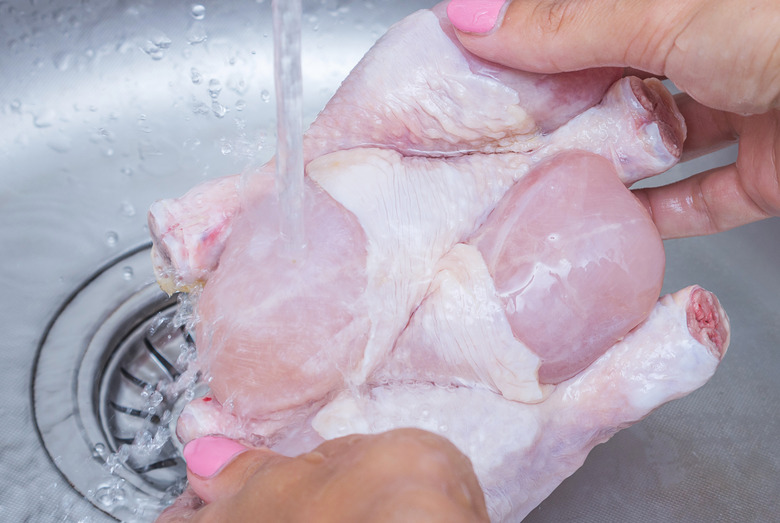Why Do People Wash Chicken?
Have you ever seen someone wash chicken? Have you done it yourself? According to a 2013 study conducted by Drexel University researcher Jennifer Quinlan, about 90% of people say that they wash their chicken before cooking it. They do so to wash the slime and bacteria off chicken fresh from the package, or because many recipes still advise people to do so.
Now, the question is: Should people actually wash chicken before cooking it? The answer is a resounding no.
"You should assume that if you have chicken, you have either Salmonella or Campylobacter bacteria on it, if not both," Quinlan explains in a press release. "If you wash [the chicken], you're more likely to spray bacteria all over the kitchen and yourself." This can also lead to other foods, linens, and surfaces becoming cross-contaminated with the bacteria that has potential to cause illness.
And no, the temperature of the water has no effect on whether or not the bacteria on uncooked chicken is killed. This is because water straight from the tap will not be hot enough. "It does not get rid of the bacteria, it doesn't kill the bacteria," Quinlan says.
This is echoed in a 2019 press release from the U.S. Department of Agriculture, in which Mindy Brashears — the USDA's deputy undersecretary for food safety — says, "Even when consumers think they are effectively cleaning after washing poultry, this study shows that bacteria can easily spread to other surfaces and foods. The best practice is not to wash poultry."
The USDA recommends that these three steps are followed to prevent illness when preparing poultry or meat:
- Significantly decrease your risk by preparing foods that will not be cooked, such as vegetables and salads, BEFORE handling and preparing raw meat and poultry.
- Thoroughly clean and sanitize ANY surface that has potentially touched or been contaminated from raw meat and poultry, or their juices. This includes your hands, which should be washed with water and soap for 20 seconds.
- Destroy any illness-causing bacteria by cooking meat and poultry to a safe internal temperature as measured by a food thermometer. The following temperatures are provided:
- Beef, pork, lamb, and veal (steaks, roasts, and chops) are safe to eat at 145 degrees Fahrenheit.
- Ground meats (burgers) are safe to eat at 160 degrees Fahrenheit.
- Poultry (whole or ground) is safe to eat at 165 degrees Fahrenheit.
The takeaway: Do not wash your chicken!
